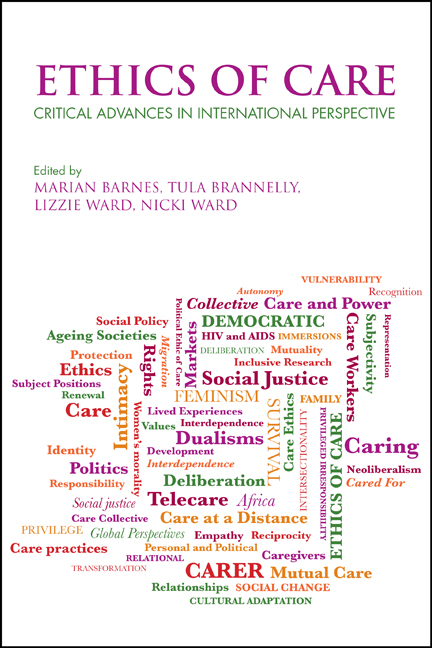Fourteen - People with intellectual disabilities (visually) reimagine care
Published online by Cambridge University Press: 08 March 2022
Summary
Introduction
Care is typically understood as both a value and a practice. The practice of care – who is cared for, how and by whom – typically reflects societal values and the (de)valuation of particular groups of people. As a practice, care ‘invokes different experiences, different meanings, different contexts and multiple relations of power, of which a political argument around care needs to take account’ (Williams, 2001, p 468).
Highlighting the perspective of the disabled care receiver, disability scholars have challenged accepted notions of care and care practices for disabled people. As articulated elsewhere in this collection (Chapter One), for many in the disabled people's movement the word ‘care’ has become synonymous with the pathologisation and medicalisation of impairment and disability (Power, 2010), with exclusion, disempowerment and loss of rights: an oppressive practice to be actively resisted (Hughes, McKie, Hopkins and Watson, 2005).
Visual media representations of disability are similarly understood as pathologising and reductive (Elks, 2005). This matters because, despite their nature as socially constructed and functional, visual representations are typically received uncritically, regarded as ‘truth’. As such, they influence the meanings and value we ascribe to others (Derrida, 2001) and how we treat these ‘others’ as a consequence. Relying on dysfunctional and dehumanising stereotypes, they reflect and shape cultural assumptions about disability, vulnerability, dependence and care (Garland-Thomson, 2001): for example, people with impairment as eternal children, helpless, unable and burden (Hevey, 1997). As a practice of power, such images are sites of oppression, of un-care (Butler, 2004).
Tying together and complicating these two concerns – care and visual representation of disability – is the argument that while the larger disability community (particularly people with physical or sensory disability) rejects dominant notions of care that paint disabled people as unable and needy in favour of self-directed support (Kröger, 2009), this same community has seldom attended to the situations or perspectives of people labelled with intellectual disabilities (ID). The emphasis on agency over care has meant that the need for (sometimes lifelong) support and dependence on others of some persons with ID – especially those who may find it more difficult to do for themselves or to direct their own care – and our understanding of how care is defined, experienced and practised by persons with ID have not been adequately theorised: an unintended consequence may be perpetuation of the devaluation of people with ID (Kittay, 2001b; Yong, 2007).
- Type
- Chapter
- Information
- Ethics of CareCritical Advances in International Perspective, pp. 179 - 194Publisher: Bristol University PressPrint publication year: 2015



